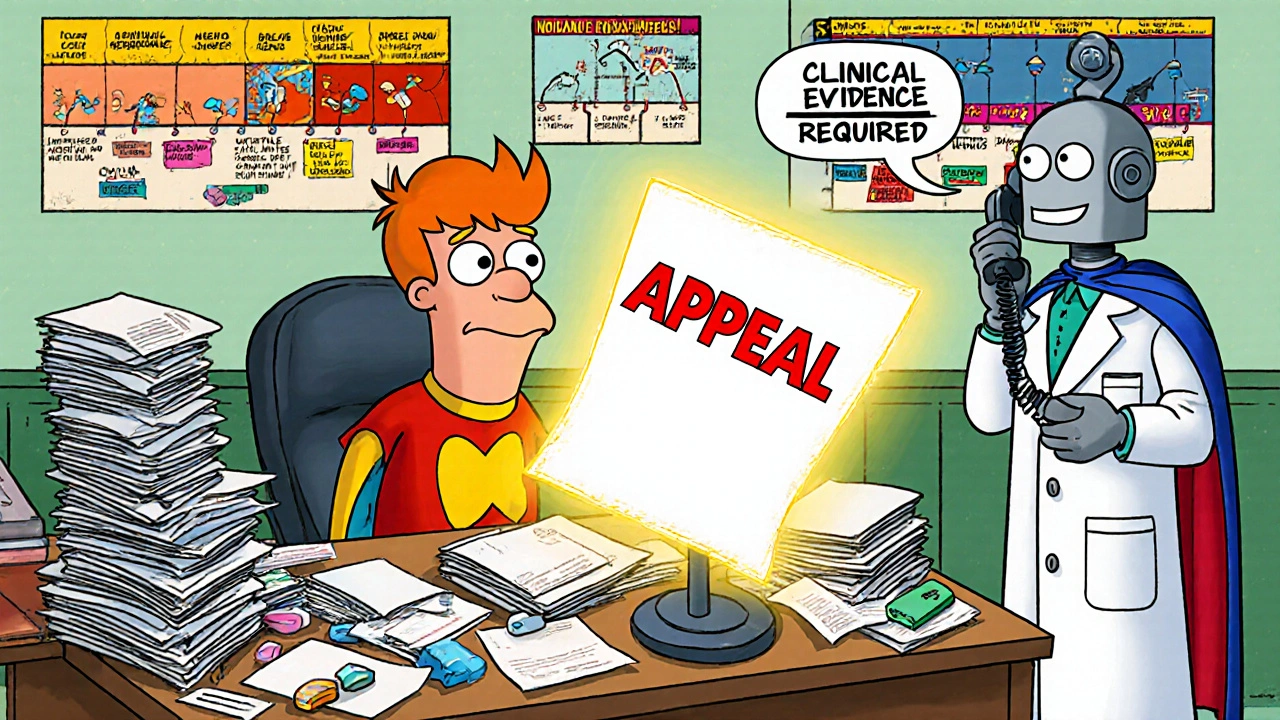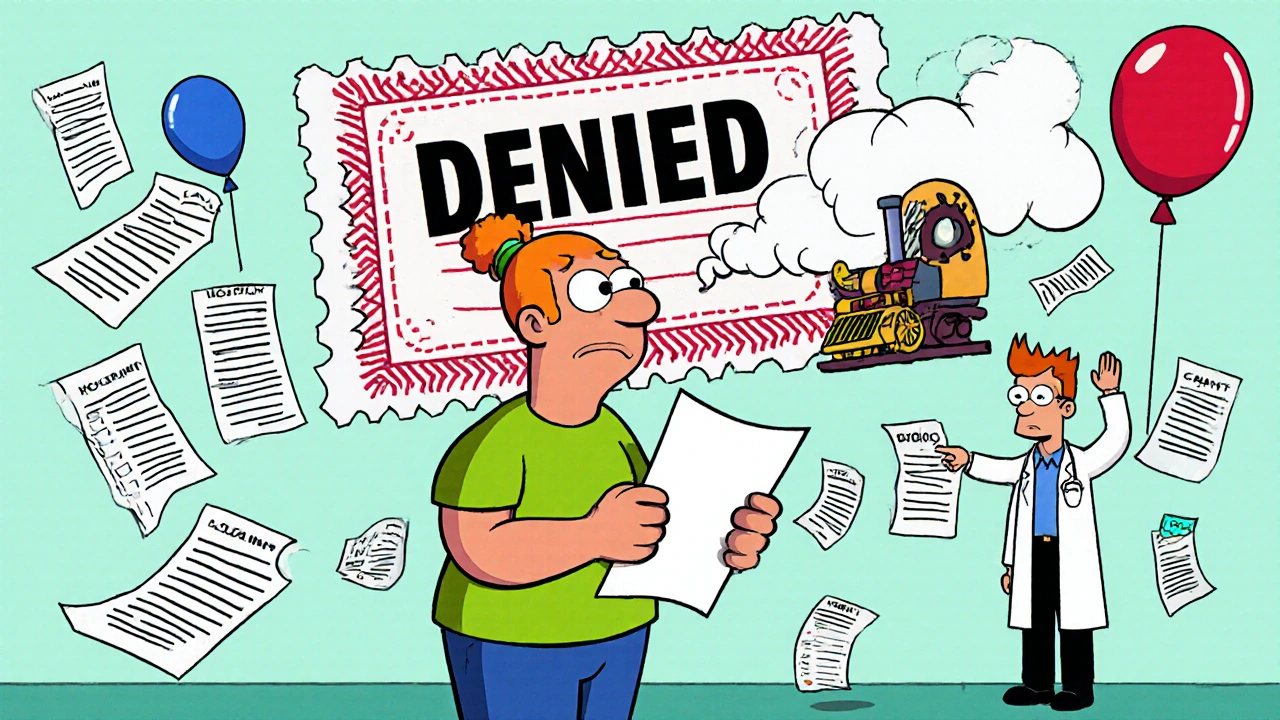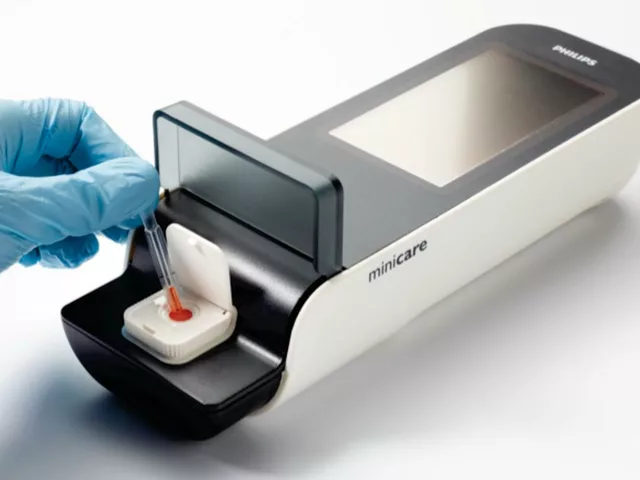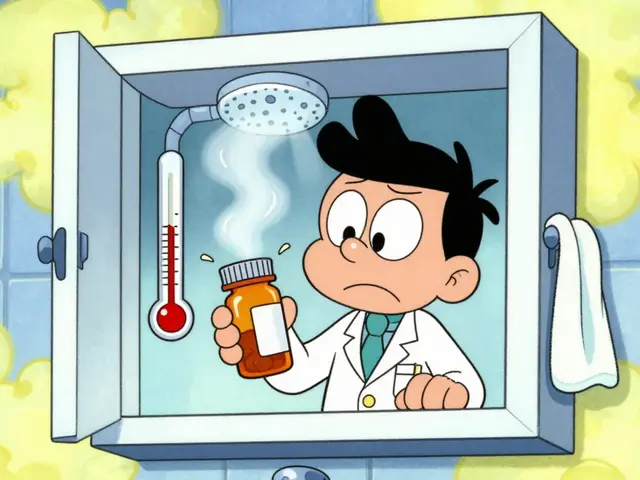When your doctor prescribes a medication and your insurance says no, it’s not just frustrating-it can be dangerous. You’re stuck between a prescription you need and a system that’s designed to delay, not help. But here’s the truth: prior authorization denials are overturned in more than 8 out of 10 cases when you appeal. That’s not luck. That’s process. And if you know how to do it right, you can get your medication faster than you think.
Understand Why It Was Denied
The first thing you need to do is read the denial letter. Not skim it. Read it. Insurance companies don’t deny medications randomly. They give you a reason, even if it’s buried in fine print. The most common reasons are:- Incomplete paperwork (37% of denials): Missing forms, wrong IDs, or unclear doctor notes.
- Lack of medical necessity (48%): The insurer says your condition doesn’t meet their criteria for this drug.
- Not covered by your plan (15%): The drug isn’t on their list, or they want you to try something cheaper first.
Look for specific codes-like CPT or ICD-10 codes. These are the language insurers use. If your denial mentions code G47.33 (obstructive sleep apnea) but your doctor wrote G47.30, that’s a mismatch. Fix it. Don’t guess. Get the exact reason, because your appeal must answer it directly.
Gather the Right Documents
You can’t appeal with a wish. You need proof. Here’s what you need to collect:- Your denial letter (the official one from the insurer).
- Your medical records: Lab results, diagnosis notes, specialist visits.
- A letter from your doctor explaining why this drug is necessary. It must include your diagnosis, why other treatments failed, and why this drug is the best option.
- Proof of previous treatment failures: If you tried three other meds and they didn’t work, list them-names, doses, dates, side effects, and outcomes.
- Your insurance ID number, full name, date of birth, and the exact drug name and dosage.
Some insurers, like CVS/Caremark, require you to include all this in a specific format. Others, like UnitedHealthcare, demand online submissions through their portal. Don’t assume. Call their provider relations line. Ask: “What exact documents do you need for a prior auth appeal?” Write it down. Then double-check.
Write a Clear, Clinical Appeal Letter
Your appeal letter isn’t a complaint. It’s a medical argument. Start with:- Your full name, member ID, date of birth.
- The drug name, dosage, and reason for the prescription.
- The exact reason your claim was denied (quote their letter).
- A point-by-point rebuttal using clinical evidence.
Example: If they denied your Humira because you didn’t try a biologic first, but you already tried three TNF inhibitors and had severe reactions, say it clearly: “Patient experienced anaphylaxis after 4 weeks on Enbrel (12/2023), severe rash on Adalimumab (3/2024), and elevated liver enzymes on Certolizumab (7/2024). All were discontinued under physician supervision. Humira is the only remaining option per rheumatology guidelines.”
Include dates. Include outcomes. Include your doctor’s clinical judgment. The Obesity Action Coalition found that 63% of successful appeals included documented treatment failures with specific timelines. Don’t say “tried other drugs.” Say “tried X on Y date, failed due to Z.”

Get Your Doctor Involved
Your doctor isn’t just a name on the form. They’re your strongest ally. Many insurers will only accept appeals with a physician’s direct statement. Ask your doctor to:- Write a letter on official letterhead.
- Call the insurer’s medical review team directly.
- Use the insurer’s own clinical criteria to justify the drug.
Keck Medicine’s 2024 analysis showed that when doctors personally contact insurers, appeal success rates jump by 32%. Why? Because a pharmacist reviewing your file doesn’t know your history. But a doctor explaining your case in real time does. Don’t let your doctor think this is “just paperwork.” Tell them: “This isn’t about bureaucracy-it’s about my health.”
Submit on Time and Track Everything
Most insurers give you 180 days to appeal. That sounds like a lot-but delays happen. Submit your appeal in writing, and do it as soon as possible. Use certified mail with return receipt, or upload it through the insurer’s portal and save the confirmation number.Once submitted, track it. Keep a log:
- Date submitted
- Method (mail, fax, online)
- Confirmation number
- Name of person you spoke to
- Follow-up dates
Insurers have 30 days to respond, but they often miss deadlines. If you haven’t heard back in 35 days, call. Ask for the case number and the name of the reviewer. If they say “it’s still in queue,” ask: “What’s the next step if it’s not reviewed by [date]?” Most people give up after one call. Don’t be one of them. 78% of physicians report having to call multiple times to get a response.
Know Your Next Steps If You’re Denied Again
If your first appeal is denied, you’re not out of options. You have two paths:- External review: You can request an independent third party to review your case. Healthcare.gov says you have 365 days from your final denial to do this. But check your state-some only allow 60 to 180 days.
- Medicare Advantage or employer plan rules: If you’re on Medicare Advantage, they must respond to appeals within 72 hours under 2024 CMS rules. If you’re on an employer plan, ERISA requires a decision within 60 days.
Also, the No Surprises Act lets you request an independent dispute resolution (IDR) for certain denials-but it’s rarely used. Only 0.3% of appeals go this route. Still, it’s an option if your drug costs over $500 a month and the insurer refuses to budge.

What to Avoid
Here’s what most people do wrong:- Not including CPT or ICD-10 codes: 89% of approved appeals include them. Your denial letter probably has them. Use them.
- Waiting too long: The average appeal takes 6-8 hours to prepare. If you wait, your condition worsens.
- Letting your doctor do all the work: You’re the patient. You know your body. You need to be the one pushing.
- Using emotional language: “I can’t afford this” won’t help. “I experienced severe joint pain after 6 weeks on Methotrexate, and my ESR levels rose from 22 to 68” will.
One Reddit user, ‘MedPatient2023,’ reversed a Humira denial in 7 days by attaching a two-page timeline of failed treatments with exact dates. Another, ‘AnonHealthWarrior,’ got denied because they didn’t include the CPT code from the denial letter. It’s not complicated. It’s precise.
What’s Changing in 2025
The system is slowly improving. The CAQH Prior Authorization Clearinghouse launched in 2024 to standardize forms and reduce administrative errors by 27% by 2025. Medicare Advantage plans now have to respond within 72 hours. But commercial insurers? Not so much. UnitedHealthcare still averages 2.1 out of 5 stars for prior auth processes. The most common complaints? Vague denial reasons and no one to talk to.AI tools are coming. McKinsey predicts they’ll cut denials by 35% by 2026. But they’ll also create new kinds of denials-ones that are harder to fight because they’re automated. That means your appeal skills will matter more than ever.
Final Thought: You’re Not Alone
Nearly 19 million medication denials happen every year in the U.S. But only 11% of people appeal. That means 82% of those who could get their medication are giving up. You don’t have to be one of them. You have rights. You have documentation. You have a doctor who wants you to get better. Use them.It takes time. It takes effort. But if you follow these steps, your odds of success are better than 8 in 10. That’s not a gamble. That’s a guarantee-if you do it right.
What if my insurance denies my appeal?
If your first appeal is denied, you can request an external review by an independent third party. You have up to 365 days from your final denial to do this under federal law, though state rules may vary. Some states limit it to 60-180 days. Contact your state’s insurance department for exact deadlines. If you’re on Medicare Advantage, you may also qualify for faster review under CMS rules.
How long does a prior auth appeal take?
Insurers have 30 days to respond to an appeal, but many take longer. If you don’t hear back in 35 days, call. For external reviews, the process can take 30-60 days. Medicare Advantage plans must respond within 72 hours for urgent cases and 7 days for non-urgent ones under 2024 CMS rules.
Do I need a lawyer to appeal?
No. Most appeals are handled successfully without legal help. The key is clear documentation, accurate codes, and persistence. However, if your appeal is denied and you’re facing high costs or serious health risks, you can consult a patient advocate or legal aid group. Some nonprofit organizations offer free help with insurance appeals.
Can my doctor appeal for me?
Your doctor can and should help by writing a clinical letter and calling the insurer’s medical review team. But you, the patient, must submit the formal appeal. Insurance companies require the patient or their authorized representative to initiate the process. Your doctor supports you-they don’t replace you.
What if I can’t afford the medication while waiting?
Many drug manufacturers offer patient assistance programs that provide free or low-cost medication during appeals. Ask your pharmacist or doctor for the name of the manufacturer’s program. Organizations like NeedyMeds and the Patient Access Network Foundation also help with copay assistance. Don’t stop treatment because of cost-there are resources.
Why do insurers deny medications they cover?
Insurers deny medications to control costs, often using automated systems that don’t understand individual medical needs. Many denials are due to administrative errors-like missing codes or mismatched forms. The American Medical Association found that 41% of denials are fixable with better documentation. It’s not always about medical need-it’s often about paperwork.
How common are prior authorization denials?
Approximately 6% of prior authorization requests are denied each year, which adds up to about 18.7 million denials across 312 million prescriptions. But only 11% of those are appealed. The reversal rate for appeals is 82%, meaning most denials are mistakes or oversights that can be corrected.
Can I appeal if I’m on Medicare?
Yes. Medicare Advantage plans must follow strict appeal timelines. As of 2024, they must respond to prior auth requests within 72 hours for urgent cases and 7 days for non-urgent ones. Original Medicare doesn’t require prior auth for most drugs, but if you’re on a Part D plan with a formulary restriction, you can still appeal. Contact Medicare or your plan’s member services for the correct form.
Start today. Get your denial letter. Call your doctor. Write your letter. Track your steps. You’ve already taken the hardest part-you refused to accept no.




